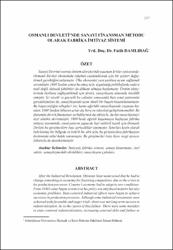| dc.contributor.author | Damlıbağ, Fatih | |
| dc.date.accessioned | 2014-09-21T13:26:18Z | |
| dc.date.available | 2014-09-21T13:26:18Z | |
| dc.date.issued | 2012 | |
| dc.identifier.issn | 1304-0235 | |
| dc.identifier.issn | 2602-3954 | |
| dc.identifier.uri | https://app.trdizin.gov.tr/makale/TVRVd09EWTJOZz09 | |
| dc.description.abstract | Sanayi Devrimi sonrası üretim süreçlerinde yaşanan krizler neticesinde, Osmanlı Devleti ekonomide rekabeti canlandırmak için bir şeyleri değiş- tirmek gerektiğini anlamıştır. Ülke ekonomisi yeni şartlara uyum sağlamak zorundadır. 1840’lardan sonra bu amaç için; uyguladığı politikalarda sadece mali değil, iktisadi faktörleri de dikkate almaya başlamıştır. Üretim süreç- lerinde ilerleme sağlayabilmek için devlet, sanayileşme alanında öncülük etmiştir. İyi niyetli ve gayretli bu çabalar sonucunda bazı sınaî yatırımlar gerçekleşmişse de, sanayileşmede uzun süreli bir başarı kazanılamamıştır. Bu başarısızlığın sebepleri ise; kamu ağırlıklı sanayileşmede yaşanan ha- talar, 1860’lardan itibaren artan dış borç ve teknoloji geliştirememektir. Bu durumda devrin finansman zorluklarının da etkisiyle, devlet sanayileşmeyi özel sektöre devretmiştir. 1880’lerde ağırlık kazanmaya başlayan fabrika imtiyaz sisteminde, sınaî yatırım yapacak özel sektörü teşvik için Osmanlı Devleti bu girişimcilere bazı ayrıcalıklar tanımıştır. Sınırları kesin olarak belirlenmiş bir bölgede ve belirli bir süre için, bu girişimcilere fabrikasyon üretiminde tekel hakkı tanınmıştır. Bu girişimciler bazı ilave vergi ayrıca- lıklarıyla de desteklenmiştir | en_US |
| dc.description.abstract | After the Industrial Revolution, Ottoman State understood that he had to change something in economy for fostering competition, due to the crises in his production processes. Country’s economy had to adapt to new conditions. From 1840’s state began to notice in his policy not only fiscal matters but also economic problems. State centered industrial efforts were begun to achieve successes in production processes. Although some industrial investments were achieved with favorable and eager trials, there was not long term success in industrialization. As to the causes of this failure: There were some mistakes in state centered industrialization, increasing external debt and failure to developing technology. This situation and the hardships of the state finance in the period, state turned to private sector for industrialization. In the fac- tory privilege system which gains momentum during 1880’s, Ottoman State gave some privileges to private sector to promote industrial investments. In a region which borders was strictly defined and for a limited time, these investors gained monopoly rights in factory made production. They were also supported with some tax privileges. | en_US |
| dc.language.iso | tur | en_US |
| dc.relation.ispartof | İstanbul Üniversitesi İktisat Fakültesi Mecmuası | en_US |
| dc.rights | info:eu-repo/semantics/openAccess | en_US |
| dc.subject | Research Subject Categories::SOCIAL SCIENCES | en_US |
| dc.title | Osmanlı devleti’nde sanayi finansman metodu olarak fabrika imtiyaz sistemi | en_US |
| dc.type | article | en_US |
| dc.relation.publicationcategory | Makale - Ulusal Hakemli Dergi - Kurum Öğretim Elemanı | en_US |
| dc.department | Gümüşhane Üniversitesi | en_US |
| dc.identifier.volume | 62 | en_US |
| dc.identifier.issue | 2 | en_US |
| dc.identifier.startpage | 199 | en_US |
| dc.contributor.institutionauthor | Damlıbağ, Fatih | |
| dc.identifier.endpage | 224 | en_US |


















